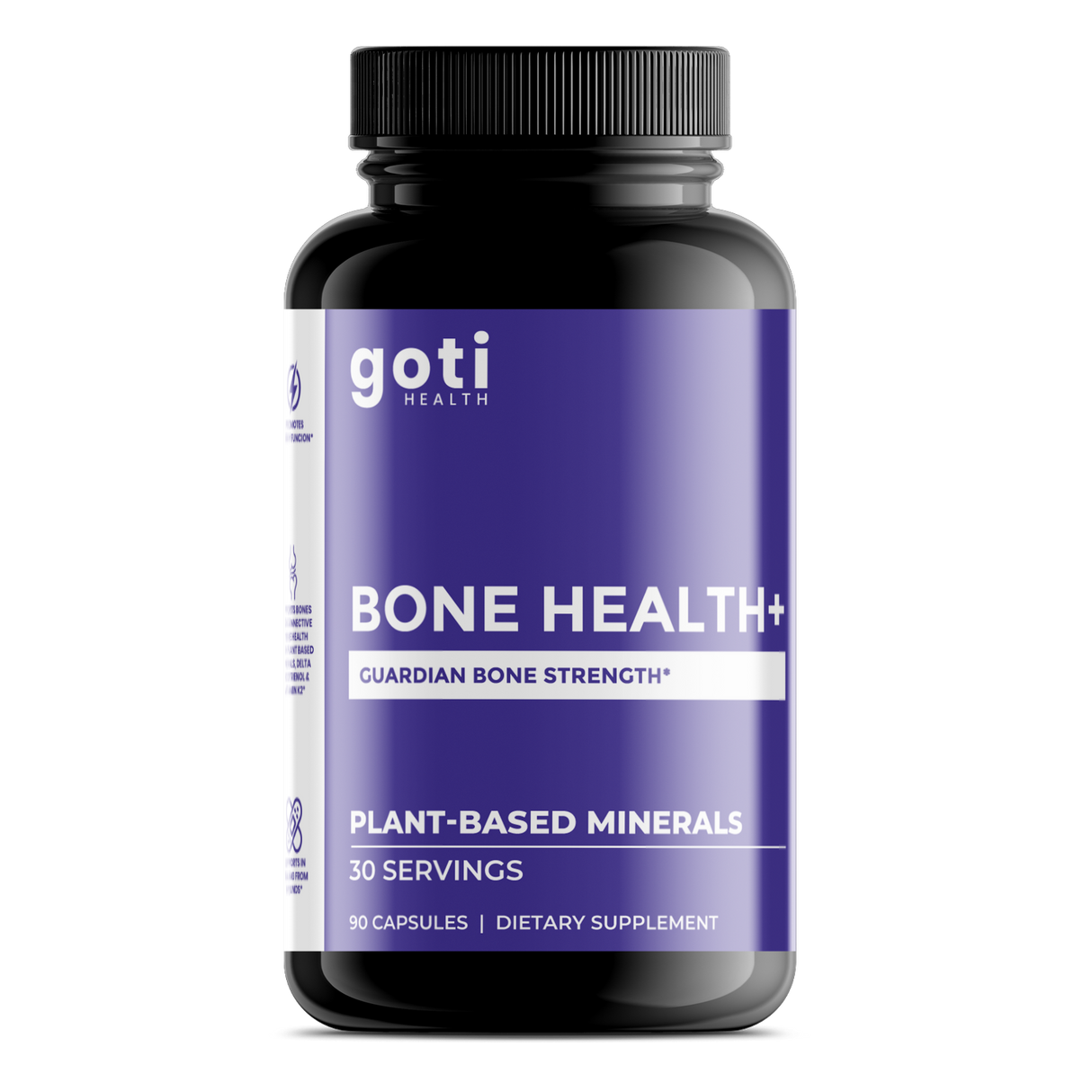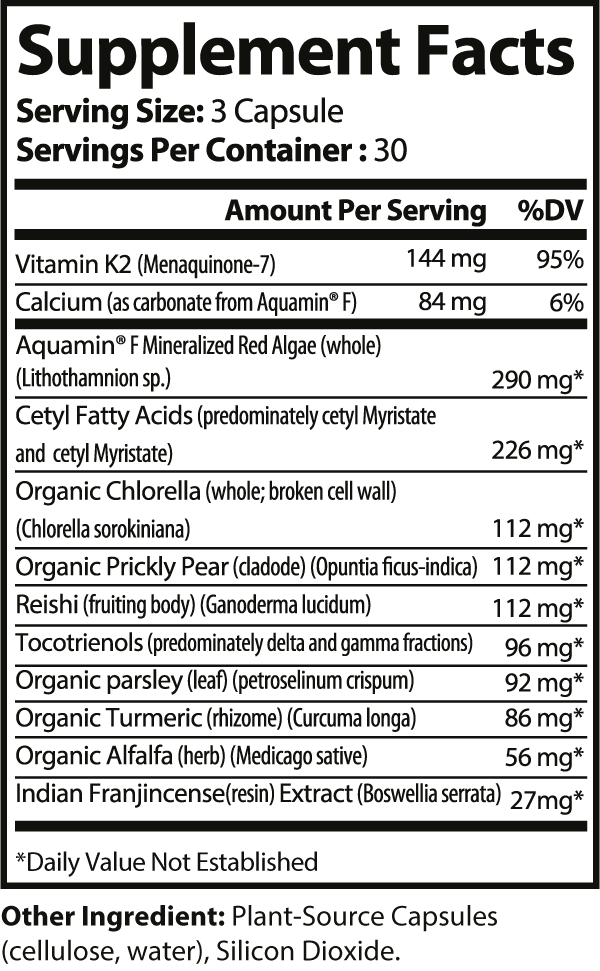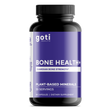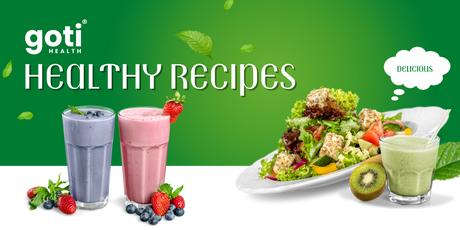Bone Health+ Plant-Based Minerals Capsules
Bone Health+ Plant-Based Minerals Capsules is backordered and will ship as soon as it is back in stock.

|
Formula Purposes & Benefits |
|
Bone Health+ is developed based on cutting-edge scientific research and expert formulation to support joint health, cardiovascular health, immune health, and increased antioxidant status. Bone Health+ combines nature-sourced minerals, tocotrienols, and vitamin K2-7 in its preferred form to promote healthy bones and connective tissues. Prioritize your bone health with Premier Bone Health providing a comprehensive support for optimal bone and connective tissue well-being. Our formula is proudly made in the USA in an FDA registered facility, following Good Manufacturing Practices (GMP) standards. Our commitment to excellence is reflected in the fact that only 4% of the supplements on the market can match our world-class standards. |
|
Formula Ingredient Deck |
Benefits Of Each Ingredient |
|
Vitamin K2 |
● May support bone health, cardiovascular health, and Vitamin D metabolism (80,81). ● May support cardiovascular health via reduced atherosclerotic activity and minimizing calcium deposits in the blood vessels (80,81). |
|
Aquamin |
● May support osteogenesis, promoting bone formation and mineralization (390) ● May support antioxidant effects and the ability to induce apoptosis in U937 cells (392). ● May support enhanced gut microbial diversity, potentially promoting digestive health (393). ● May support improvements in lipid profiles, including potentially lowering LDL cholesterol levels (394). |
|
Calcium |
● May support bone health, muscle function, and cardiovascular health (36,37). ● Regulates processes of bone resorption, mineralization, and fracture repair (36,37). ● Increases the effect of physical exercise on bone mineral acquisition in the period preceding puberty (36,37). ● May reduce the development of preeclampsia (36,37). |
|
Organic Chlorella |
● May support antioxidant function through its high levels of carotenoids, which can protect against DNA damage and scavenge free radicals (265). ● May support cardiovascular health by potentially reducing cholesterol and triglyceride levels (265). ● May support detoxification by aiding in the removal of methylmercury from the body (265). ● May potentially combat depression by helping to reduce oxidative stress in the brain (266). |
|
Organic Prickly Pear |
● May support immune health via redox balance, decreased oxidative damage to lipids, and improved antioxidant status in healthy humans (368). |
|
Reishi |
● May support immune health, antioxidant activity, balanced estrogen levels, antiviral support, antibacterial, reduced stress, improved exercise performance, and blood sugar regulation (194,195). ● May support immune health via high concentrations of betagluxans which increase natural killer cell activity and t-cell mediated immunity (194). |
|
Tocotrienols |
● May support immune function, cognitive health, cardiovascular health, and bone health (204,205,206,207,208) ● May support immune health via neutralizing free radicals and reactive oxygen species, and increased T lymphocyte-mediated immune function (204). ● May support cardiovascular health via reduced cholesterol (204). ● May support cognitive function via reduced oxidative stress, inflammation, and DNA damage of neuronal tissues (208). |
|
Organic Parsley |
● May support immune health, antioxidant activity, and aids in the detoxification process (203,204). |
|
Organic Turmeric |
● May support antioxidant, cardio-protective, anti-inflammatory, anti-microbial, nephro-protective, hepato-protective, immunomodulatory, and anti-rheumatic effects (123). ● May reduce inflammation via decreases of inflammatory markers such as c-reactive protein, interleukin 6, tumor necrosis factor, and decreased cytokine production (123). ● May support joint health via decreases in connective tissue inflammation and improved pain in individuals with osteoarthritis (122). ● May support blood sugar regulation via increased pancreatic beta cell function and improved insulin sensitivity (121). ● May support cardiovascular and liver health via reduced accumulation of advanced glycation end products (AGE), reduced lipid peroxidation, and improved vascular function. ● Curcumin may exhibit antioxidant activity via scavenging of superoxide anion (∙O2−∙) and hydroxyl radicals (∙OH) (scavenging of inflammation molecules) (118,119). ● Curcumin may modulate breast carcinogenesis through its effect on cell cycle and proliferation, apoptosis, senescence, cancer spread and angiogenesis (119). ● May target cancer growth pathways such as the NFkB, PI3K/Akt/mTOR, MAPK and JAK/STAT (119). |
|
Organic Alfalfa |
● May support immune, digestive, and energy levels (395). ● The high antioxidant capacity may allow for free radical scavenging of reactive oxygen species (395). ● May support liver health via reduced fatty acid accumulation in the liver (395). |
|
Frankincense |
● May supports immune health, joint health, joint pain, and healthy inflammation levels (117,124, 125,400). ● Reduces inflammation via decreases in c-reactive protein, decreased arthritis in osteoarthritic patients, and reduced joint stiffness (124,400). ● Extracts of Boswellia have suppressed inflammation via local tissue tumor necrosis factor-α (TNFα) and interleukin-1β (IL-1β) (125,400). |
|
Proper Use of This Supplement |
|
|
Our Formula Vs Other Formulas on the Market.
|
|
|
|
1. Uses third party independently tested ingredients that are made in the USA, GMP certified, and made in an FDA registered facility. |
1. Source cheap ingredients from heavily polluted soils. Even “organic” supplements not third party tested have been removed by FDA due to high levels of heavy metals. |
|
2. High quality bone support herbs and vitamin k-2 in a bioavailable and efficaciously dosed formula. |
2. Uses cheap synthetic sources of bone support herbs that may have heavy metals due to poor product quality and lack of third-party lab testing for heavy metals. |
Sources:
- Khaing, W., Vallibhakara, S. A., Tantrakul, V., Vallibhakara, O., Rattanasiri, S., McEvoy, M., Attia, J., & Thakkinstian, A. (2017). Calcium and Vitamin D Supplementation for Prevention of Preeclampsia: A Systematic Review and Network Meta-Analysis. Nutrients, 9(10), 1141. https://doi.org/10.3390/nu9101141
- Coureix, D., Jaffré, C., Lespessailles, E., & Benhamou, L. (2005). Cumulative effects of calcium supplementation and physical activity on bone accretion in premenarchal children: a double-blind randomised placebo-controlled trial. International journal of sports medicine, 26(5), 332–338. https://doi.org/10.1055/s-2004-821040
- Jovic, T. H., Ali, S. R., Ibrahim, N., Jessop, Z. M., Tarassoli, S. P., Dobbs, T. D., Holford, P., Thornton, C. A., & Whitaker, I. S. (2020). Could Vitamins Help in the Fight Against COVID-19?. Nutrients, 12(9), 2550. https://doi.org/10.3390/nu12092550
- Chilelli, N. C., Ragazzi, E., Valentini, R., Cosma, C., Ferraresso, S., Lapolla, A., & Sartore, G. (2016). Curcumin and Boswellia serrata Modulate the Glyco-Oxidative Status and Lipo-Oxidation in Master Athletes. Nutrients, 8(11), 745. https://doi.org/10.3390/nu8110745
- Barzegar, A., & Moosavi-Movahedi, A. A. (2011). Intracellular ROS protection efficiency and free radical-scavenging activity of curcumin. PloS one, 6(10), e26012. https://doi.org/10.1371/journal.pone.0026012
- Banik, U., Parasuraman, S., Adhikary, A. K., & Othman, N. H. (2017). Curcumin: the spicy modulator of breast carcinogenesis. Journal of experimental & clinical cancer research : CR, 36(1), 98. https://doi.org/10.1186/s13046-017-0566-5
- Suhett, L. G., de Miranda Monteiro Santos, R., Silveira, B., Leal, A., de Brito, A., de Novaes, J. F., & Lucia, C. (2021). Effects of curcumin supplementation on sport and physical exercise: a systematic review. Critical reviews in food science and nutrition, 61(6), 946–958. https://doi.org/10.1080/10408398.2020.1749025
- Pivari, F., Mingione, A., Brasacchio, C., & Soldati, L. (2019). Curcumin and Type 2 Diabetes Mellitus: Prevention and Treatment. Nutrients, 11(8), 1837. https://doi.org/10.3390/nu11081837
- Ashtary-Larky, D., Rezaei Kelishadi, M., Bagheri, R., Moosavian, S. P., Wong, A., Davoodi, S. H., Khalili, P., Dutheil, F., Suzuki, K., & Asbaghi, O. (2021). The Effects of Nano-Curcumin Supplementation on Risk Factors for Cardiovascular Disease: A GRADE-Assessed Systematic Review and Meta-Analysis of Clinical Trials. Antioxidants (Basel, Switzerland), 10(7), 1015. https://doi.org/10.3390/antiox10071015
- Mata, I., Mata, S., Menezes, R., Faccioli, L. S., Bandeira, K. K., & Bosco, S. (2020). Benefits of turmeric supplementation for skin health in chronic diseases: a systematic review. Critical reviews in food science and nutrition, 1–15. Advance online publication. https://doi.org/10.1080/10408398.2020.1798353
- Hetland G, Tangen JM, Mahmood F, Mirlashari MR, Nissen-Meyer LSH, Nentwich I, Therkelsen SP, Tjønnfjord GE, Johnson E. Antitumor, Anti-Inflammatory and Antiallergic Effects of Agaricus blazei Mushroom Extract and the Related Medicinal Basidiomycetes Mushrooms, Hericium erinaceus and Grifolafrondosa: A Review of Preclinical and Clinical Studies. Nutrients. 2020 May 8;12(5):1339. doi: 10.3390/nu12051339. PMID: 32397163; PMCID: PMC7285126.
- Mallard B, Leach DN, Wohlmuth H, Tiralongo J. Synergistic immuno-modulatory activity in human macrophages of a medicinal mushroom formulation consisting of Reishi, Shiitake and Maitake. PLoS One. 2019 Nov 7;14(11):e0224740. doi: 10.1371/journal.pone.0224740. PMID: 31697749; PMCID: PMC6837746.
- Mara de Menezes Epifanio, N., Rykiel Iglesias Cavalcanti, L., Falcão Dos Santos, K., Soares Coutinho Duarte, P., Kachlicki, P., Ożarowski, M., Jorge Riger, C., & Siqueira de Almeida Chaves, D. (2020). Chemical characterization and in vivo antioxidant activity of parsley (Petroselinum crispum) aqueous extract. Food & function, 11(6), 5346–5356. https://doi.org/10.1039/d0fo00484g
- Traber, M. G., & Atkinson, J. (2007). Vitamin E, antioxidant and nothing more. Free radical biology & medicine, 43(1), 4–15. https://doi.org/10.1016/j.freeradbiomed.2007.03.024
- Wu, D., & Meydani, S. N. (2014). Age-associated changes in immune function: impact of vitamin E intervention and the underlying mechanisms. Endocrine, metabolic & immune disorders drug targets, 14(4), 283–289. https://doi.org/10.2174/1871530314666140922143950
- De la Fuente, M., Hernanz, A., Guayerbas, N., Victor, V. M., & Arnalich, F. (2008). Vitamin E ingestion improves several immune functions in elderly men and women. Free radical research, 42(3), 272–280. https://doi.org/10.1080/10715760801898838
- Browne, D., McGuinness, B., Woodside, J. V., & McKay, G. J. (2019). Vitamin E and Alzheimer's disease: what do we know so far?. Clinical interventions in aging, 14, 1303–1317. https://doi.org/10.2147/CIA.S186760
- Widaa, A., Brennan, O., O'Gorman, D. M., & O'Brien, F. J. (2014). The osteogenic potential of the marine-derived multi-mineral formula aquamin is enhanced by the presence of vitamin D. Phytotherapy Research, 28(5), 678-684. doi: 10.1002/ptr.5038
391.O'Callaghan, Y. C., Drummond, E., O'Gorman, D. M., & O'Brien, N. M. (2013). Antioxidant and pro-apoptotic effects of marine-derived, multi-mineral aquamin supplemented with a pine bark extract, Enzogenol, and a green tea extract, Sunphenon. Journal of Medicinal Food, 16(10), 920-926. doi: 10.1089/jmf.2012.0258
- Crowley, E. K., Long-Smith, C. M., Murphy, A., Patterson, E., Murphy, K., O'Gorman, D. M., Stanton, C., & Nolan, Y. M. (2018). Dietary supplementation with a magnesium-rich marine mineral blend enhances the diversity of gastrointestinal microbiota. Marine Drugs, 16(6), 216. doi: 10.3390/md16060216
394.Cronin, B. E., Allsopp, P. J., Slevin, M. M., Magee, P. J., Livingstone, M. B. E., Strain, J. J., & McSorley, E. M. (2016). Effects of supplementation with a calcium-rich marine-derived multi-mineral supplement and short-chain fructo-oligosaccharides on serum lipids in postmenopausal women. British Journal of Nutrition, 115(4), 658-665. doi: 10.1017/S0007114515004948
- Lee, E., Lim, Y., Kwon, S. W., & Kwon, O. (2019). Pinitol consumption improves liver health status by reducing oxidative stress and fatty acid accumulation in subjects with non-alcoholic fatty liver disease: A randomized, double-blind, placebo-controlled trial. The Journal of nutritional biochemistry, 68, 33–41. https://doi.org/10.1016/j.jnutbio.2019.03.006
- Al-Yasiry, A. R., & Kiczorowska, B. (2016). Frankincense--therapeutic properties. Postepy higieny i medycyny doswiadczalnej (Online), 70, 380–391. https://doi.org/10.5604/17322693.1200553




